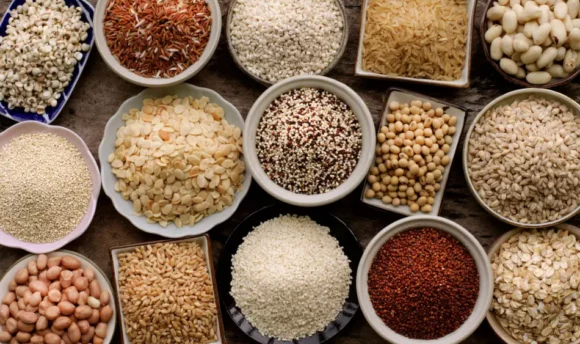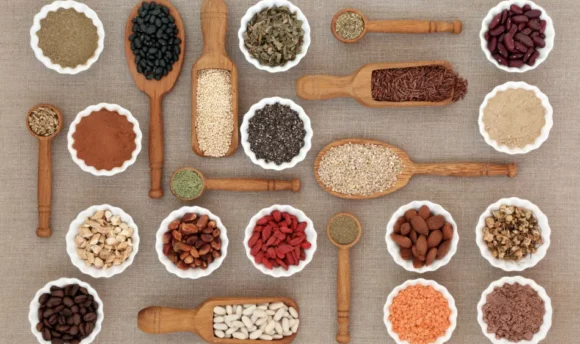Is Crab Healthy? Nutrition and Calories
Comprehensive analysis of the nutritional content of one of the most appreciated seafood around the world for its succulent flavor and high lean protein content.

Crab meat is remarkably low in calories and, when cooked properly, is one of the healthiest meats you can eat.
When we talk about cooking it properly, we mean avoiding bathing it in oils and butter that would greatly increase its caloric content. Cooked crab on its own has a mild, slightly sweet, and juicy flavor and does not need too many garnishes for you to enjoy it.
With more than 4,500 known varieties of crab, this type of seafood is a common part of diets around the world, being not only an exotic delicacy but also a nutritional element with important health benefits.
In HealthReporter, you will find all the details about their nutritional table and some tips to make them part of a weight loss diet.
Is Crab Healthy?
Yes, the nutritional content of crab meat has one of the healthiest profiles among the different seafood species. This marine delicacy is full of vitamins, minerals, and healthy fats that the body uses to strengthen all body systems.
In order to eat crab meat, its external skeleton must be broken to find its tasty meat, which is highly appreciated in global gastronomy. It has an important content of B vitamins and selenium along with omega-3 acids, a powerful combination for fighting heart disease and improving nervous health.
The most widely consumed crab varieties worldwide are Blue Crab, King Crab, Dungeness Crab, and Snow Crab. King crab is 78% water and has an important protein content of only 83 calories per serving, making it highly appreciated in the gastronomic world.
Are Crab Legs Healthy?
Yes, crab legs are a great ally for health, especially to avoid heart disease since crab legs contain lean meat that is very low in fat and calories.
They have a high-quality protein content with a low saturated fat content and are easily digested, making them suitable for consumption at any age.
What Are the Health Benefits of Crab?
#1 Crab helps improve nervous system health
Proper mental health depends on elements such as copper, omega-3 fatty acids, selenium, and B vitamins, all of which are found in large quantities in crab meat.
Thanks to this potent combination of nutrients, they promote signaling between neurons and prevent inflammation. According to research, a diet rich in omega-3 fatty acids may reduce the risk of nervous system diseases such as Alzheimer’s.
#2 Eating crab prevents cardiovascular diseases
Omega-3 fatty acids are essential for fighting heart disease; therefore, consuming foods containing them at least 1 or 2 times a week is recommended.
The addition of these fatty acids helps reduce triglycerides, prevents the formation of clots in the arteries, and lowers blood pressure. Copper, which is also found in crab meat, plays an important role in heart health by promoting the absorption of iron, which is used to form healthy red blood cells responsible for distributing oxygen throughout the body.
#3 Stronger bones
Another important nutrient found in high-protein crab meat is phosphorus, which is essential for the health of the skeletal system along with the teeth.
What Are the Possible Side Effects of Eating Crab?
#1 Can cause allergic reactions
Like all types of shellfish, the crab can cause allergic reactions in sensitive individuals, manifesting as skin rash, itchy skin, abdominal pain, and vomiting.
#2 Heavy metal intoxication
Some species of crab, such as brown crab or Cancer pagurus, may contain high levels of mercury and cadmium, highly harmful elements that can cause long-term health problems.
#3 Naturally high in sodium
In as little as 3.5 ounces of crab meat, there can be as much as 395 mg of sodium, which you should be aware of if you need to follow a sodium-restricted diet. The current Food and Drug Administration (FDA) recommendation for a healthy adult is 2300 mg of sodium per day.
Is Crab Good for Weight Loss?
Yes, the crab has only 83 calories in an ounce serving, which makes it very light meat but with great nutritional potential.
It is very low-fat seafood, and its protein content is highly prized by those looking to build muscle mass.
However, you need to be sure that you are consuming real and fresh crab meat, as there are versions of fake crab sticks or surimi on the market. These imitation crab sticks are common in sushi and can be high in sugar and starches as they are additives used to mimic the original flavor.
Nutrition Facts
A small portion of crab has a large number of vitamins and minerals, is rich in fatty acids and protein, and contains very few calories.
Its nutritional content and health benefits vary according to the species, so we have evaluated the blue crab, one of the most consumed worldwide.
Nutritional table (per 100 g)
| Calories/Nutrient | Amount |
| Calories (Kcal) | 83 |
| Net Carbs (g) | 0 |
| Fats (Total) | 0.74 |
| Protein (g) | 17.9 |
| Sodium (mg) | 395 |
| Cholesterol (mg) | 97 |
Source: https://fdc.nal.usda.gov/fdc-app.html#/food-details/174205/nutrients
High in vitamins and minerals
Vitamins and minerals are essential for the development and maintenance of our biological functions, and crab meat is a great collaborator in this aspect with its contribution of iron, zinc, magnesium, vitamin C, B vitamins, selenium, and phosphorus.
Its high nutrient content due to its marine origin and its diet based on plankton and algae makes it a highly valued meat in many types of diets in different cultures around the world.
High in protein
When looking at the crab’s nutritional information, you can immediately notice one of its greatest treasures: its protein content.
Its 17.9 grams of protein in 100 grams makes it the ideal seafood to include in a weight loss or muscle-building training diet, without the fishy taste that many prefer to skip.
Crab meat is one of the best sources of high-quality protein in the animal world because its meat is free of carbohydrates and very low in fat, which favors a clean supply of this macronutrient that is absorbed very quickly, making it an excellent post-workout meal.
Low in fats and calories
The crab meat is very light, with only 0.74 grams of fat in a portion of 100 grams. A contraindication for its regular consumption is its sodium content since, in a small portion, it contains 395 mg, so patients with cardiovascular risk or any dietary indication that requires sodium restriction should take this into account when eating crab.
The way you cook your food directly affects its nutritional content. It is recommended to prepare the crab meat boiled to take advantage of all its benefits without adding fats such as melted butter so as not to increase the calories in the dish and also to avoid adding excessive salt.
High in cholesterol
Crab meat has as much cholesterol as a serving of beef (103 mg) or a serving of lamb (97 mg), so despite being seafood with many health properties, its consumption should be moderate.
A person at risk of cardiovascular diseases should not consume more than 200 mg of cholesterol per day, 300 mg being the recommended amount for healthy adults.
A Word From Nutritionist
Seafood is a rich source of phosphorus, calcium, iron, and selenium. And crab meat is one of the crustaceans with the best nutritional profile.
Aside from its high protein value, its mineral content promotes maximum synthesis and utilization of protein, especially phosphorus, which crab meat is rich in, promoting bone health.
Patients with cardiovascular risk require a lifestyle change by adding moderate physical activity and consuming foods rich in copper and omega-3 fatty acids, which allows the formation of healthy red blood cells to properly oxygenate body tissues.
Eating fish and shellfish such as King Crab, Blue Crab, and Dungeness Crabs which are rich in these nutrients, at least twice a week, ensures a good supply of all their vitamins and minerals.
Conclusion
Crab meat contains a high nutritional value thanks to the environment where it is raised and the food it consumes, which is based on algae and plankton.
It is also appreciated in world gastronomy because its meat has a great flavor that allows it to be used in different dishes. Besides, the most avid fitness foodies always look for it because of its lean protein content, which is almost fat-free.
The two important points to highlight are its elevated cholesterol and sodium content, both of which can affect the human body, especially cardiovascular health.
It is recommended to consume it in moderation as it is worth including it in the diet to enjoy its richness in vitamins, minerals, and omega-3 fatty acids.

















































 Select your language:
Select your language: 








